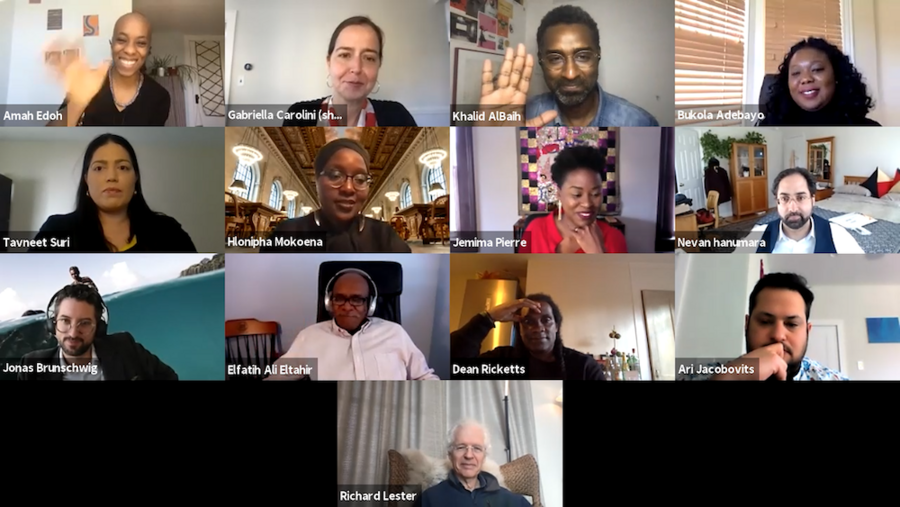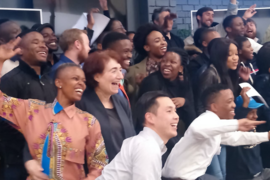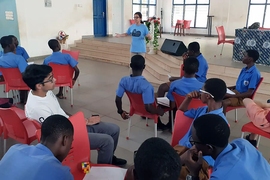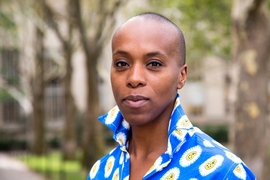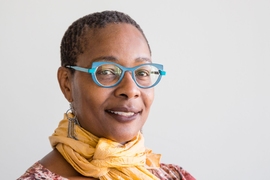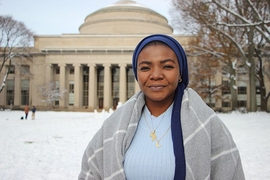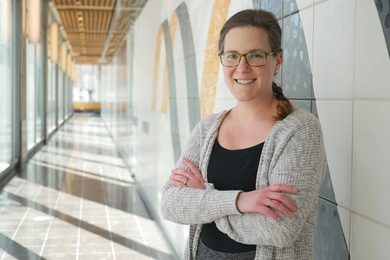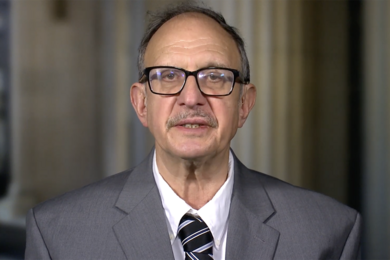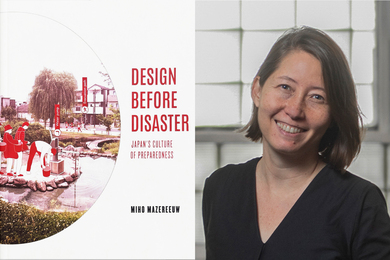Last year protests erupted in the U.S. and parts of South America, Europe, Asia, and Africa, with the central message — Black Lives Matter. Ignited by the demonstrations for racial justice and police reform in the U.S., the protests around the world erupted in solidarity with the American cause, but took on the nuances of each context. The adaptation of the Black Lives Matter slogan to “Las Vidas Negras Importan” in Colombia or “Papuan Lives Matter” in Indonesia has underscored the common theme of racial inequality, but also raised questions about the intersectionality of Black identities around the world and how this influences demands for racial justice. This complexity was highlighted in a vibrant discussion held on April 14 to launch the MIT Africa Distinguished Visitors program.
The distinguished visitors program is sponsored by the Office of the Associate Provost for International Activities and is led by the MIT Africa Faculty Steering Committee, which includes faculty from across the Institute: Associate Professor of International Development and Urban Planning Gabriella Carolini; Breene M. Kerr Professor of Civil and Environmental Engineering Elfatih Eltahir; Director of the Institute for Data, Systems, and Society Munther Dahleh; Louis E. Seley Professor of Applied Economics Tavneet Suri; and Homer A. Burnell Assistant Professor of Anthropology and African Studies M. Amah Edoh. The program will continue this fall and will include visiting lectures and other forms of collaboration with public figures, artists, innovators, and researchers from across the continent.
“We anticipate that these activities will help to lay the foundations for new research initiatives between MIT and African collaborators,” said Richard Lester, associate provost for international activities and the Japan Steel Industry Professor of Nuclear Science and Engineering. “They will also help to strengthen MIT’s community of faculty, staff, and students whose work is motivated and informed by challenges, problems, and opportunities of particular significance to African societies.”
With speakers from Sudan, Nigeria, South Africa, and the United States, the virtual panel sought to position racial justice in an international context. At the foundation of the discussion were Africa-centered understandings of race as a social construct, and how processes of racialization structured African society during colonialism and continue to inform the continent’s position on the global stage. Edoh, who moderated the conversation, began by questioning the oft-held belief that race is not as relevant in or for African countries, save for South Africa, as it is in Europe and the United States. It was a question that would take panelists back to the past in order to understand the present.
“I think there is a misunderstanding of what race is, and so the premise that we have to start with is the idea of race is global. To think about race is not to think about race as biology, but to think about race as the meanings prescribed to presumed differences and to think about processes and historical processes that create notions of race and notions of difference,” said Jemima Pierre, associate professor at the University of California at Los Angeles in the Department of African American Studies and Anthropology.
The contemporary global setting is a result of Western expansion, which brought with it exploitation premised on a difference of race, explained Pierre. This historical hierarchy still informs the global economy, in which former colonies are indebted to their colonizers and African states remain trapped in an extractive economic structure.
There can be no doubt that race was a key factor in the colonial exploitation of the African continent and the resultant legacies of colonialism and the slave trade, and it is a conversation that must still be reckoned with, Bukola Adebayo, a senior producer for CNN Digital bureau in Nigeria, pointed out. As a reporter, Adebayo reached out to Africans for their reflections on the George Floyd protests, but many believed race was not an issue in Africa.
“I do understand people who share those kinds of thoughts, and I think it’s because many times we’ve not interrogated the colonial engagements we’ve had in the past; it’s very eroded,” she said.
Yet, as protests began to erupt in Africa, with demonstrations against colonial monuments and memorabilia that celebrated the people who enslaved Africans, as well as the growing call for the return of stolen African artefacts, Adebayo sees the beginning of a conversation on the role that race still plays in Africa today.
“We can’t forget that there was a brutal past to these artworks being taken out of the country, and there’s still not a racial reckoning, or justice or repatriation of these artworks,” said Adebayo. It was not just art, but also culture, literature, and, importantly, the actual people who were taken and enslaved. “This was done by people of one race to another race and that is really at the heart of this matter.”
Even tribal identity did not escape the colonial experiment, with colonizations concretizing perceived tribal difference and creating a false hierarchy as a means to divide the indigenous inhabitants of a region, said Pierre. Those tribal identities endure, and “What’s your tribe?” is a common introduction in Sudan, said Khalid AlBaih, a Sudanese artist and political cartoonist, whose work illustrated political movements such as the Arab Spring and the Sudanese Revolution of 2018 to 2019.
As independent African states began to define their own national identity, the desire to leave behind these colonial structures could in fact stifle the difficult debates yet to be fully ventilated. South Africa shifted from a country in which Black South Africans were completely cut off from the continent to one in which a liberal constitution legislated a nonracial, nontribal society, explained Hlonipha Mokoena, a historian and anthropologist at WiSER (the Wits Institute for Social and Economic Research) at the University of the Witwatersrand in Johannesburg.
“One of the things that happens in South Africa is a sort of cognitive dissonance in which on the one side we want to participate in all the conversations that we’ve missed in the Black diaspora but then the constitution simply says no,” said Mokoena, describing the country’s strict hate speech laws.
South Africa’s post-apartheid constitution prohibits the advocacy of hatred or discrimination based on race, ethnicity, gender, age, ableism, culture, language, and other statuses. In an attempt to rectify the injustices of apartheid, the new constitution’s protective stance can inhibit potentially controversial public conversations. The progressive constitution has served to push the public discourse into the future, but overlooks key points in the global discussion on race and identity that South Africa may have not have had the chance to wrestle with while under isolation during apartheid, said Mokoena.
“I would now say there’s a movement of what I call a kind of revisionist movement, where people actually go back to the origins of the constitution and want to revise that by sort of presenting a different historical narrative of how the constitution came into being, and so there is this very touchy, painful conversation between the future that is being projected for us by the constitution, and the past that many of us have to live with simply because we are Black and we have friends in different parts of the diaspora,” said Mokoena.
The end of colonialism did not mean the end of a racialized system of oppression. Take West Africa, where the cultural and economic divide between francophone and anglophone Africa remains stark. So much so that a linguistic divide and the material marginalization based on this divide is threatening to tear Cameroon apart, explained Adebayo.
“There is still an economic divide. Even though the white presence has left the country, they left economic, tribal, and political division that has not been interrogated until now and being named what it is,” said Adebayo. “It’s so heart-breaking to see how this has just been left to fester for such a period of time. I was hoping the conversation in the U.S. was going to kickstart this conversation in our countries.”
“Africa continues to represent racial otherness, and we see it, for example, in the breaking off of the continent into North Africa versus sub-Saharan Africa. People throw around the word ‘sub-Saharan’ as if it’s a normal thing — it was constructed by the racial scientists to say that there is a white north and a black south and if that itself is not about racialization, I don’t know what is,” stated Pierre, who is also the author of the book “The Predicament of Blackness: Postcolonial Ghana and the Politics of Race.”
This is a geographical and racial distinction AlBaih knows well.
“Race is a huge part of Sudan’s identity, or the little that we try to know about it. One of our biggest issues is basically our knowledge of us, the question of who is Sudanese, and it’s all based on race,” he said.
The Sudanese cartoonist spent his childhood in a country in which the racialized north-south divide led to a secession war, and, ultimately, to the independence of South Sudan, before moving to Qatar.
“In Sudan, I’m considered the top class, I’m considered the oppressor because I’m from the north, I’m from the Arabized tribes, I’m Muslim, all of these things. And then I move to Doha where I’m supposed to be part of the oppressor group — the Arabs and the Muslims — and then I go there and I’m considered a Black person and for me, as a child, I was shocked. … It really opened my eyes to a lot of things.”
The country’s own origin story is routed in resistance and enslavement, but these narratives are rarely examined, he said. Sudan, as a modern nation-state was a result of British occupation of the region. Race was fundamental to how the colony was structured, and remains a part of the fabric of the country today. It’s a phenomenon of racialization that informs racial identity across the continent and the diaspora. Colonialism and the trans-Atlantic slave trade created a racial hierarchy that served the West and justified the mistreatment of people of African descent. While the exact nature of the oppression may have differed in each country, it was informed by this internationalized system of racism.
This is perhaps why the 2020 demonstrations against racial injustice in the United States resonated so deeply with peoples of African ancestry around the world. Whether it was the removal of colonial statues in Belgium, or the #EndSARS protests in Nigeria against state security that evolved from the colonial system, they were underpinned by a desire to dismantle systemic racism in society.
The organic international alliance on display during last year’s protests shows the need for a more global discourse on how racial inequality still informs contemporary social structures — even in countries where Black people are the majority. Examining race and racism in a global historical context can allow a greater connection between racial social justice movements from Minneapolis to Khartoum, Ferguson to Lagos.
